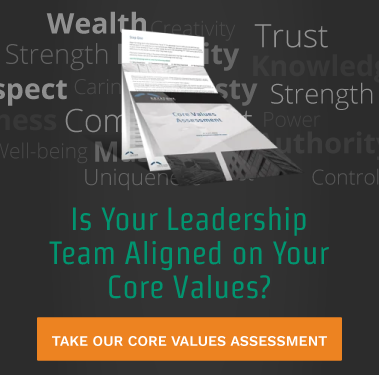We’re fortunate to have worked with many ESOPs over the years, assisting them in hiring CEOs and other senior level leaders. Through this work we’ve come to appreciate just how unique ESOPs are and how different from other types of ownership structures.
Because ESOPs are unique, it only makes sense that the most effective leaders in an ESOP environment are also unique; Not just any run of the mill executive or senior leader will be effective in an ESOP.
Download this assessment to learn if your leadership team is aligned on your core values.
Based upon our experience, we have found there are 5 key leadership attributes that can make or break the effectiveness of an ESOP Leader 1) Low Ego/Self Esteem 2) Communication 3) People Development 4) Listener and 5) Ability to make decisions.
In honor of employee ownership month (October), we’re sharing two articles, laying out each of the 5 characteristics. We’re providing a little insight on how to evaluate candidates (internal or external) against these characteristics. These articles can help in making better hiring decisions within your ESOP and creating stronger leadership teams in the ESOP community.
ESOP LEADERSHIP QUALITY #1: EGO & SELF ESTEEM
Leaders with overly large egos can be seen as “Cocky” or “Arrogant” and simply do not work in ESOPs.
One of the greatest outcomes of creating an ESOP is engagement. Because employees are owners, they are likely to work harder, work more collaboratively and generally be better stewards of company resources. It’s not just a job, they are owners and as the company grows, so does the values of their ESOP accounts. You could sum it up by saying they just “care” more.
To sustain and enhance this engagement, leadership must treat the employees like what they are – owners! Owners expect and deserve to be heard and considered. They deserve to be treated with respect and dignity, and any good owner should provide constructive feedback on how things can be done better in the business.
Arrogant, big ego leaders have real trouble with feedback from lower level employees; “How dare that person on the assembly line question our strategy?” “That idea can’t possibly make sense, she doesn’t have a college degree.” You get the picture, arrogant executives and leaders will quickly drive the engagement right out the company.
The best leaders for an ESOP environment are competent and confident, but never cocky.
Arrogant leaders are fairly easy to spot in an interview process. Behavioral based questions focused on how they engage with employees will bring this out quickly. One of my favorites is, “Give an example of an idea that was brought by one of your team members? What was it and were you able to implement it?” If it takes too long for them to answer, or they can’t think of any particular examples, dig deeper on how they work with their reports. Paying attention to how they say “I” in the interview versus “we” can be very telling.
ESOP LEADERSHIP QUALITY #2: CONSISTENT COMMUNICATION
While emotional and inspirational speeches at the annual meeting are nice, they really don’t drive engagement on a day to day basis.
What does increase engagement and assists in getting the most from your ESOP culture is what we refer to as “consistent communication.” Leaders who are consistent communicators understand employee owners need, and deserve, an on-going understanding of 1) how the business is doing, 2) where the business is going, and 3) how he/she fits into the goals and strategy.
With this understanding they will utilize multiple methods to stay in touch. This can be one on one meetings, group meetings, well timed e-mails etc. The method is not as important as the frequency.
We’ve found that some leaders and executives enjoy this piece of the job, others find it a necessary evil and still others avoid it altogether.
Behavioral based questions in your interview process will illuminate where a candidate falls on this continuum. “Describe how you like to communicate with employees?” What is your cadence for 1 on 1’s, staff meetings etc.? What is the format of those meetings, how long do they last and what is generally discussed?"
In addition, questions like, “Where is your office in comparison to the shop floor/factory etc.?" and “How often do you walk around the facility?” will give you an understanding of how visible, or invisible, they are to the employee population.
Leaders who are not visible and proactive in their communication will not be nearly as successful in an ESOP. Remember, employees are not just employees, they are owners. Any good owner wants and needs to know how the company is doing.
ESOP LEADERSHIP QUALITY #3 LEADERSHIP/PEOPLE DEVELOPMENT
While leaders with strong coaching, mentoring and leadership development skills are positive in all types of companies, in the ESOP world it is essential.
The reason for this has everything to do with turnover.
When an ESOP is working as intended, engagement is high and employee turnover is low. However, when turnover is very low, it can create an inward-looking culture where change happens very slowly. The ultimate effect is the company lags behind others in their industry.
Unfortunately, we’ve known some ESOPs who no longer exist because they didn’t react soon enough to changes in their marketplace.
Many non-ESOP companies, whether they recognize it or not, partially rely on employee turnover for new ideas and innovation. The new blood coming into these companies on a consistent basis sparks new thinking and creates growth.
Don’t get me wrong, I’m not suggesting ESOPs should artificially create higher turnover. On the whole, low turnover beats high turnover every time. However, leadership in ESOPs must recognize that the low turnover may create issues unless it is mitigated by consistent people/leadership development.
This development includes technical and leadership skill development, but must also focus on what’s happening outside of the company in the way of industry and leadership best practices to ensure your ESOP is keeping up with the rest of the world.
Whether or not a candidate for a leadership role is a people developer is relatively easy to parse out with behavioral interview questions. “Describe a particular person you are proud of who you have helped to develop?” "Describe specific programs you have led or been involved in to make sure team members were being developed.” “What has been your budget for leadership development?” It’s also a good idea to ask them how they specifically keep themselves abreast of issues in their industry and the broader marketplace. Leaders who spend time developing themselves are more likely to spend time on others.
In our next blog, we'll discuss ESOP leadership attributes numbers 4 and 5 - The Listener and the Ability to make decisions. Read Part 2 here.




